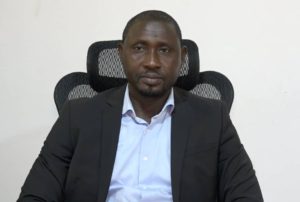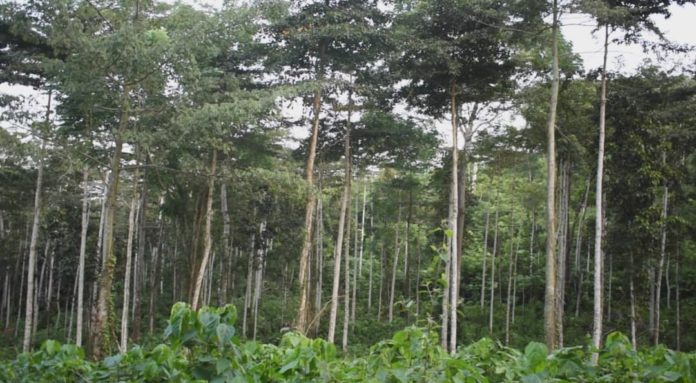An Environmental NGO, Nature and Development Foundation (NDF) is demanding accountability from the government over how levies collected for the Forest Plantation Development Fund (FPDF) for the restoration of Ghana’s forests have been spent over the years.
A report published by the NGO claims the Forest Plantation Development Fund (FPDF) Board has been non-transparent in its activities over the last 20 years.
In 2000, parliament passed the Forest Plantation Development Fund Act. The Act mandates the establishment of the Forest Plantation Development Fund Board to provide financial assistance for the development of private forest plantation on lands suitable for commercial timber production. The fund is also expected to finance research and provide technical advice to persons involved in commercial plantations.
Money for the operation of the Fund shall be derived from the proceeds of the timber export levy imposed on air-dried and unprocessed timer exported out of the country. The fund is also expected to raise money from grants and loans; as well as money provided by Parliament and the Finance Minister for private forest plantation purposes.
Director of Nature and Development Foundation Mustapha Seidu estimates “the fund has collected not less than 10 million Euros over the period in levies”. This translates into more than 65 million Ghana cedis, aside from direct government contribution to the fund and grants. The levy is paid by timber firms into a special account of the Forestry Commission and then transferred to the Forest Plantation Development Fund (FPDF) account; usually quarterly.

Managing Director of one of Ghana’s largest wood processing companies Samartex, and Chairman of the Forest Industries Association of Ghana Richard Duah Nsenkyire says “from rough estimates, the accrued sums should be enough to plant about 500 hectares of forests annually. So, when you talk about the last two decades, about 10,000 hectares.”
But the NDF report says “the timber industry was not formally aware of disbursements from the fund… There is limited access to the fund by its intended beneficiaries (forest plantation developers), as well as weak participation of stakeholders in the governance of the Fund.”
“We have not even been able to establish how much area (of the plantation) they have established since 2000… The timber companies have no clue what the fund is doing. No one knows who the beneficiaries of the fund are. No one understands how the fund is distributed. No one understands which areas have been planted. So, as stakeholders in the forestry industry, it is worrying that a fund established for the purpose of replenishing forests and establishing areas, both for climate change (fight) and for fibre, we can’t seem to find any evidence of its work,” Mr. Seidu noted.
Mr. Nsenkyire agrees there is no evidence of work done by the fund. “I have not seen any plantation from this fund. It’s very difficult to comment on the transparency of it. I have never seen their operational account, their financial account, neither have I seen it being called to the Public Accounts Committee to justify what they have used the fund for… Initially, there was always a representative of the (timber) industry on the board but ever since the law was changed, there is nobody from the industry representing our interests,” he said.
The law says the board shall with the approval of the Minister for Lands and Natural Resources prepare and publish criteria for the disbursement of money from the Fund. But the report says this has not been done. “Though the law (Act 583) requires the FPDFB to publish criteria for disbursement of the fund, these criteria were unknown to persons in the industry. The criteria were not also on the website of the Board. According to the respondents from the timber industry, some of their organizations had made formal complaints of this lack of information on the FPDF to the Minister for Lands and Natural Resources,” the report said.
The law also says the books of account of the Fund shall be audited by the Auditor-General every year. But the NDF report says “further checks at the Auditor General’s Department as in March 2017, the Department did not have the Forest Plantation Fund Board in its database. This implies that as of March 2017, the Board may not have been audited by the Auditor General as prescribed by legislation since it began operations and this is contrary to the law that established it.”
The law additionally says the Board shall submit to the Minister not later than six months after the end of each financial year a report on its activities. The Minister shall within two months after the receipt of the annual report submit the report to Parliament. Mr. Seidu says that has also not been done over the years. “There should be an annual audit of the fund. And it’s actually a complete breach of the statutes that establish the fund,” he said.
But the Forest Plantation Development Fund has denied claims there is no evidence of its work since establishment. “The first board… we were able to give out loans and grants to small scale farmers. You know the monies are not enough, so you cannot give much. We also gave out grants in form of cutlasses, wellington boot, all over Ghana,” Alberta Essuman who is an administrator at the fund explained.
A member of the governing board of the fund and Member of Parliament for Oforikrom Dr. Emmanuel Marfo says the fund has over the years focused on small-scale producers because the funding is not enough. Asked for details on how much plantation the fund has been able to develop over the years, he said the board is now planning to commission the Forestry Institute of Ghana to conduct a study and provide comprehensive details on that.
“We are focusing on supporting just the small-scale plantation developers. We have paper records. But what this board has decided is that we want to now get the data on all the farmers that we have supported. So, we are going to commission the Forest Research Institute to do that kind of work,” he explained.
“I must admit that over the years, what we have been doing is just giving support. But we have not taken care of our visibility and securing the data on who has benefited. When FORIG is done with that work for us, we will be able to tell what acreage or area we have done in terms of plantation development. That data is lacking,” Dr. Marfo added.
He denies claims in the NDF report that the board has not put out the criteria for which plantation developers can access the fund. “The process is transparent. You come here, you apply, you bring your papers. Whether you are getting a grant or a loan, whatever you ask for and whatever we can offer, we come in and offer,” Dr. Marfo explained.
On claims annual reports to the Minister of Lands and Natural Resources have not been submitted, he said; “the board is required to submit a report to the minister. The subsequent actions are to be taken is by the ministry. But as far as the board is concerned, we have always submitted our report to the ministry…”
On claims the accounts of the board have not been audited over the years, Dr. Marfo explained; “As we speak, our yearly audit is ongoing. So as far as our board is concerned, our board (appointed since 2017), we can only speak to what we are doing currently as a board,” he concluded.
Source: www.gardja.org








